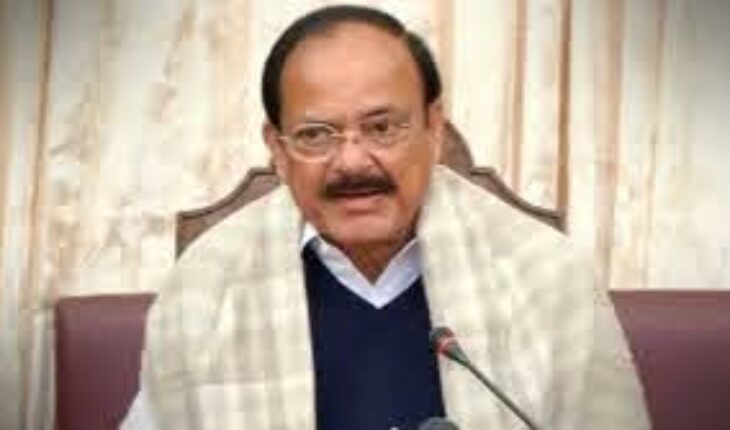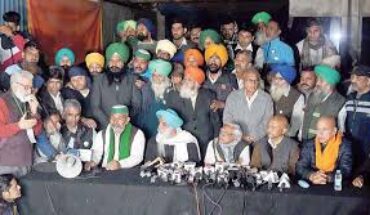NEW DELHI : Vice President of India, M. Venkaiah Naidu today called for a mass movement to promote digital literacy and urged all technological and educational institutions to play a leading role in that endeavor.
Virtually launching ‘Adi Shankara Digital Academy’ at Kaladi, the birthplace of Adi Shankaracharya, the Vice President said that information is the main commodity in the present-day knowledge society and whoever has quick access to information has the advantage. He called ‘digitalization’ as the medium of access to such information.
Drawing attention towards the unprecedented disruptions caused by Covid-19 pandemic, Naidu said that it has forced millions of students out of classrooms due to closure of schools and the world community is trying to address this challenge by adopting online education.
He said technology provides us an opportunity to transform teaching and learning and expressed the need to constantly update and develop education models that suit the new era’s demands in view of the fast-changing technology.
Enumerating several benefits of online education, the Vice President said that it can enable access to quality and affordable education in remote areas; it allows for a personalized learning experience and is especially helpful for groups such as working professionals and housewives who might not be able to attend regular courses.
Because of these advantages, the Vice President opined that online education is likely to remain a preferred choice in the post-pandemic period as well. There is no doubt that the COVID-19 pandemic has changed the education landscape forever, he added.
Observing that even before COVID-19, the adoption of technology in education was gaining momentum, Naidu said that global EdTech sector is attracting billions of dollars of investments and offers a huge opportunity to not only learners but to education entrepreneurs as well. He exhorted the youth to come forward and innovate to tap the potential offered by this sector.
Observing that the Covid-19 pandemic has forced us to learn how to keep the socio-economic process going in times of adversity, he said this experience has thrown up questions like how many are equipped to live the digital way. “Issues of availability of infrastructure, access to the required tools like computers and smart phones, speed and availability of internet came to the fore for which solutions need to be found out”, he added.
Vice President, however, cautioned to adopt a realistic approach in terms of what online education can deliver and what it cannot. “Online classes facilitate better teacher-student interaction through chat groups, video meetings, voting and document sharing, but it cannot replace the personal touch and warmth of a classroom”, he said.
Referring to a recent study by Azim Premji University, Naidu underlined that a vast majority of the teachers and parents consider the online mode of education inadequate and less effective. He opined that this could be partly due to hasty adoption of online education necessitated by Covid-19 that has left much to be desired in terms of quality.
Stressing the importance of face-to-face classes and schools, he said that school provides a socializing space to students and enables them to imbibe values and discipline. Physical fitness, sports and Yoga are important elements of holistic development of the students which cannot be attained by online education alone, he said.
Stating that ancient Gurukul system strived to build a direct relationship between the Guru and Shishya, the Vice President said that this ‘nearness’ or ‘closeness’ to an able Guru is very important to impart value-based and holistic education among the children. Therefore, Naidu called for developing a hybrid education model, in which classes are conducted both online and offline for all-round development of the students.
He also emphasized the need to put an end to rote learning and promote critical thinking, imagination and innovation among the students.
Calling for bridging the digital divide that exists between rural and urban areas, he wanted conscious policy decisions to support online education infrastructure by ensuring internet connectivity.
Stating that the evolution of human civilization has been a saga of innovation and use of tools for improving the ease and the comfort of living, Naidu said that science and technology have made a huge difference in the way we live. “Digitalisation is the order of present-day life. E- education, e- health, e-commerce, e-governance etc are the virtual reality now”, he added.
He praised ‘Digital India’ initiative for preparing the nation for Industrial Revolution 4.0 and empowering the citizens with technological entitlements. “The main objective is to improve the quality of life in all possible ways”, he added.
Talking about the extensive use of digital technology in different sectors ever since the pandemic disrupted our normal routine, the Vice President commended the Indian judiciary for digitally hearing and disposing of cases. He specially complimented the Supreme Court for taking the lead in this regard and said this is the way forward.
He further said that E-medicine has found new traction and e-delivery of government services and entitlements in our country is proving to be effective with huge gains. “In essence, this is the era of ‘digital life’. Virtual reality is the new reality”, he added.
Referring to the World Bank estimate that improved access to internet adds to GDP growth, Naidu said that this indicates the scope and potential of technology and process improvement through innovation.
Calling for putting in place ‘an equitable digital eco-system’ in the country, the Vice President said the Governments and private sector need to work on appropriate models for collective effort to enable a ‘digital India’ which gives every citizen her or his due.
To fully realize the benefits of the digital technology, the Vice President called for bridging the gap between ‘digital haves’ and ‘digital have nots’.
Appreciating a number of digital initiatives by the Government for promoting digital education, he said that the New Education Policy (NEP) 2020 proposes integration of technology in a big way for enhancing learning outcomes. He hoped that this push for digital education will play a key role in making India a global hub of education and innovation.
He praised the Adi Shankara Group of Institutions for nurturing the leaders of tomorrow and hoped that Adi Shankara Digital Academy (ASDA) would live up to the people’s expectations by providing them a good online learning experience.






